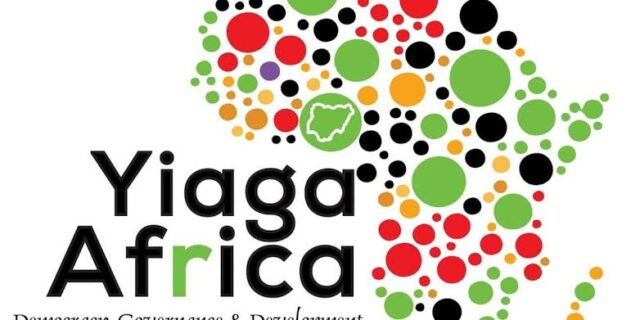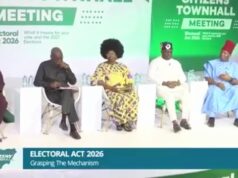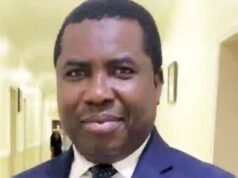By Editor
Ahead of Saturday’s off-cycle governorship election in Anambra State, the Yiaga Africa has outlined three critical benchmarks it said will shape the credibility of the electoral process.
This is contained in the pre-election’s observation statement, jointly signed by Dr. Asmau Maikudi, Chair of the 2025 Anambra Election Mission; and Samson Itodo Executive Director
Yiaga Africa.
It listed efficiency of logistics, integrity in electoral procedures, and impartiality of security agencies as the critical benchmark to measure the success of the election.
The Independent National Electoral Commission (INEC) had said that a total of 2,802,790 registered voters are eligible to participate, including 140,370 newly registered voters across the 326 wards.
The electoral umpire also said that election will take place in 5,718 polling units, as two out of the expected 5,720 units have no registered voters; while 16 political parties have fielded candidates for the governorship race, including two women.
The Yiaga Africa statement said that drawing from past electoral experiences and recent by-elections, these three tests will serve as the litmus test for public trust in the INEC, security agencies, and political actors.
It warned that failure to meet these standards could further erode voter confidence and deepen the legitimacy crisis in Nigeria’s democracy.
Speaking on the efficiency test, the organisation said that credible elections are predicated on efficient election administration, especially the timely deployment of election materials and personnel that enable voters to exercise their rights.
“Logistics challenges have historically marred Anambra elections, leading to late poll openings in multiple election cycles. As Yiaga Africa Watching The Vote reveals, in 2013, only 39% of polling units opened at 7:30am. In 2017 a dismal 17% opened at 7:30am, while 2021 recorded a marginal improvement of 28% of polling units opening by 7:30am. In July 2025, logistical challenges, long queues, and poor crowd management plagued the Continuous Voter Registration exercise.
“The key question is, can INEC ensure timely and efficient deployment of personnel and materials to enable early commencement of polls? This election offers a critical opportunity for INEC to demonstrate operational efficiency through timely deployment, early opening of polling units, and effective coordination with transport unions and security agencies,” the statement said.
On the integrity test, Yiaga Africa said that as a rule-based activity, the integrity of elections is largely dependent on the enforcement of the rules and guidelines for the election.
According to the joint statement, the credibility of the election will largely depend on INEC’s ability to adhere to its electoral legal framework and its rules regarding key aspects of the elections.
“For instance, consistent use of the BVAS for accreditation in all polling units, prompt upload of polling unit results (Form EC 8A) to the IReV portal, suspension of elections in areas where substantial disruptions occur, in line with Section 24 of the Electoral Act and lastly, transparent collation of results at Ward and LGA levels, with accredited observers and party agents given access to observe the collation process,” it said.
It said that the key question for determination under this test is, will INEC enforce its guidelines and maintain transparency in the application of electoral procedures?
While listing the importance of the impartiality test, Yiaga Africa said that public confidence is rooted in the posture and conduct of security agencies whose primary responsibility is to safeguard the electoral environment without pandering to incumbency influence or partisan considerations.
It said that the ability of security agencies to maintain neutrality in managing election security will be a decisive factor in defining the credibility of the election.
“The August 2025 bye-election revealed troubling instances of politicians moving around with armed escorts and the use of vigilante operatives to intimidate voters. Security agencies must resist political pressure and uphold their constitutional duty to remain neutral and professional.
“The key question is, will security agencies maintain neutrality and protect voters, observers, and election officials without partisan interference?” it added.
It noted that this election marks the seventh off-cycle governorship election since the 2023 general elections and will serve as a critical test of the INEC under the new INEC Chairman, Prof. Joash Amupitan, apart from it also presenting a key moment to assess Nigeria’s democratic credentials ahead of the 2027 general elections.
The organisation said that it is deploying Watching the Vote as part of a broader civil society election observation hub supported by the European Union under the EU Support for Democratic Governance Project (EU-SDGN).
The Election Observation Hub comprises organizations like Yiaga Africa, The Kukah Centre, International Press Centre (IPC), Centre for Media and Society (CEMESO), Nigeria Women Trust Fund (NWTF), ElectHER and TAF Africa.
Cumulatively, the Hub is deploying 687 observers across Anambra State, working in coordinated clusters that cover election integrity and results verification, disability inclusion, gender participation, peacebuilding, media and misinformation tracking, logistics observation, and real-time data reporting.
It said, “On Election Day, WTV will deploy 250 stationary observers to a representative statistical sample of 250 polling units and 22 mobile observers in all 21 local government areas (LGAs) of Anambra state.
“This will enable Yiaga Africa to provide timely and accurate information on the conduct of accreditation, voting, and counting as well as to independently verify the official results for the Anambra gubernatorial election as announced by INEC.
“If the announced results reflect the ballots cast at polling units, we will confirm the outcome. However, Yiaga Africa will expose any manipulation of the announced results if they do not match the results announced and posted at polling units,” the report said.
It among others recommended the arrest and prosecution of vote buyers by proactively identify and arrest all individuals engaged in vote buying on election day, while also collaborating closely with INEC officials at polling units (PUs) to ensure swift response and enforcement.
Discover more from TheTimes Nigeria
Subscribe to get the latest posts sent to your email.









